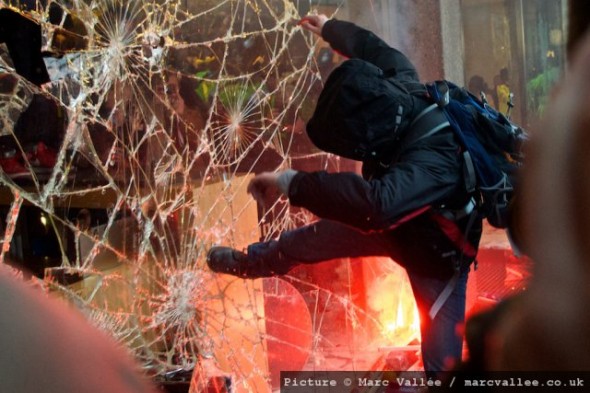
LONDON, UNITED KINGDOM – 10.11.10. Student protesters and police clash outside the Conservative Party headquarters at Millbank in central London on Wednesday 10th November 2010. Early in the day 50,000 students and supporters marched against the governments plans to rises tuition fees to £9,000 per year. (Photo by Marc Vallée/marcvallee.co.uk) © Marc Vallée, 2010. All rights reserved.
A journalist protects the identity of sources who supply information in confidence and material gathered in the course of her/his work
Last week many NUJ members reported on the events outside the Conservative Party headquarters at Millbank in central London. The clashes between police and student protesters was of great public interest. Many frontline journalists, at great personal risk, gathered news content for the purpose and informing the wider public of the events of the day.
The police have started their criminal investigation, for many hours the police did not have police photographers or evidence gatherers at the scene. It is likely that the police will turn to photographers, journalists and media groups for material that was gathered.
It is a fundamental journalistic principle not to hand over material, to the state or elsewhere. It is not the role of journalists to collect material for the Police.
As Tim Gopsill and Greg Neale wrote in, Journalists – 100 Years of the NUJ “On a practical and important level, if angry crowds get the idea that journalists are going to hand over pictures to the police they are likely to turn on them.”
A journalist is entitled not to voluntarily hand over material that the police request and can require the police to seek a Court Order from a judge. A journalist can then make representations to the Judge if they wish. This applies both under the Police & Criminal Evidence Act (PACE) and counter-terrorism legislation. The European Convention on Human Rights, Article 10, Freedom of Expression may be engaged, in relation to confidentiality of sources and material, and also Article 2, Right to Life, as to the safety of journalists.
If you are approached by the police for your material you should contact the NUJ before you do anything. If you are a member, during office hours you can contact the NUJ Legal Department on 020 7843 3721. If you urgently need help you call the 24hr NUJ emergency legal helpline on 0800 5877530.
We will get you legal advice and support in dealing with the police request.




[...] This article, written by me, was originally published by the London Photographers Branch of the [...]
Errr….. ! So you just go round archiving what the fuck you like with out any responsibility, we don’t live in a police state, although I think you would much prefer it , so you could act like a real actionman or woman on the edge of conspiricy theory saving the innocent people from police corruption, instead of just being a voyeur with an income ….
Marc writes:
“If you are approached by the police for your material you should contact the NUJ before you do anything”
Good advice – but my understanding is that once you have been approached by the police for material you cannot legally get rid of it or do anything else to frustrate the legal process. I’m no lawyer – Marc can you get Roy to clarify this?
When I had some material that I didn’t want the authorities to get hold of in the past I separated it from material that I was happy to publish and sold it to the NUJ. The NUJ then sold it to the IFJ in Brussels, taking it out of the jurisdiction of the courts and out of my own control. We called this the “Brussels Run” and it worked well.
The time to do this is BEFORE the knock on the door and John Toner in the Freelance Office has all the necessary documentation and experience to help.
David
Thanks for sharing. What a psleaure to read!
@David Hoffman.
Thank you David.
Roy Mincoff saw the draft of this before it want up and he gave it the green light. (For those of you who do not know who Roy is he is the NUJ legal officer and a lawyer.)
I will ask Roy about your point David and post his reply here once I get it.
[...] order to obtain film of photos of events, such material should not be handed over without one. The London Photographers Branch has put out guidance on defending sources and material. Journalists have also successfully challenged an editorial line on occasions. Please contact the [...]
Dave is right – under the PACE it is an offence (obviously) to destroy or dispose of material once police have informed you they intend to get an order to take possession of it.
You can of course say you have already got rid of it. This was done scucessfully by Thames TV in the famous Wapping photographers case.
It was also the basis of the Brussels Run to which Dave refers. As an NUJ official I handled the Brussels run for a time, but it was a process for the age of celluloid. The photographers – quite a number of them – handed over prints and negs to the NUJ, which handed them to the IFJ – the point being that Belgium is outside the jurisdiction of the English courts.
(The IFJ is actually sitting on quite a collection of dramatic images of civil unrest. At times there has been talk of mounting an exhibition or publishing a book though it was have to be abroad.)
However, in the digital age when images can be whizzed anywhere in nanoseconds it is not really relevant.
You could email your dodgy images to some place else immediately after an event, but the vital point is that you have to surrender ownership of them. If you own and control an image you can can be required to submit it if the police secure an order.
This was the crux of the Wapping case (1988), in which 4 NUJ photogrpahers (Andrew Wiard, Andrew Moore, Ilkay Mehmet and Jason Gold) were summonsed for contempt for failing to comply with an order of the Central Criminal Court to hand over images of police attacking demonstrators at Wapping. They had sent their images to Brussels and argued that they could not get them back. NUJ and IFJ leaders confirmed this in the witness box, adding that even if the photogs asked for them they would not give them back. On this basis the court had to acquit. (The full story is in the NUJ history book.)
Dave is in error on one point. He says he sold the images to the union, which is untrue. He handed them over for free (and his copyright too), tho I can understand why he might not want that known.
@Tim Gopsill
Thank you for that Tim. Very helpful.
[...] also like to quote the NUJ’s excellent advice, given after the occupation of Millbank, to those journalists who are approached by the police for [...]